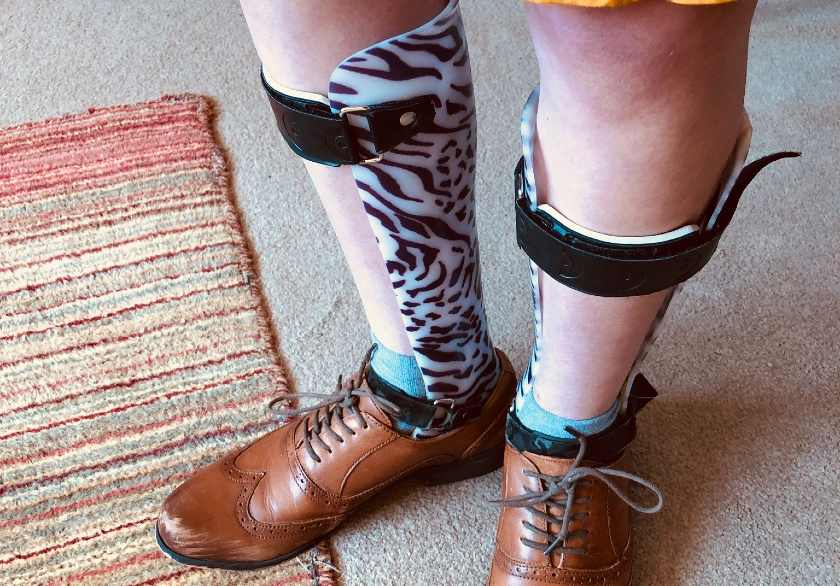To mark National Cerebral Palsy Awareness month this March, journalist and writer Chloe Tear tells us the most important lessons she has learned while living with Cerebral Palsy.
I was born 8 weeks early and due to complications I have mild cerebral palsy. I wouldn’t say my disability defines who I am, but it has certainly shaped my life. With March being Cerebral Palsy (CP) Awareness Month, I started to think about how my life has been impacted by CP. It turns out I’ve been taught various lessons along the way.
1. There isn’t a wrong way of doing things
When you’re at school, you crave to be like your peers. Whether we like it or not, humans are renowned for building a social identity and desire to be accepted by those around them.
This concept can cause an inner battle for disabled people. We instinctively try to mimic those around us. But what if you can’t? I spent far too long wanting to do things the ‘right way’, but quickly realised it was okay to do things my way. I might go about things a complete different way but that doesn’t make it wrong.
To truly achieve my goals I have to embrace and acknowledge any limitations and work around them. Knowing my disability actually allows me to succeed. By adapting, I’m giving myself the best chance.
2. My voice is valued
When I was 15 years old, I started writing a blog. Little did I know, this little blog would still be going 8 years later! Not only that, it has enabled me to develop a voice that’s not afraid to speak the truth.
I’m willing to fight for what is right. I will stand by the disability community and fight for an equal society. Together we’re stronger. Disabled people are not obliged to fight for every injustice if we’re sick and tired of the uphill battle, but I’ve chosen to speak out.
It is also those who have listened and shared my work that have helped give value to my voice, and are helping to shape a better future for disabled people.
3. Buy good shoes!
My walking pattern can be more accurately described as a wobble. When outside, I wear AFO (ankle foot orthotic) splints which allow me to walk further by ensuring my feet are flat on the floor – but they make shoe shopping a nightmare!
After a lifetime of wobbling, I’ve come to the conclusion that investing in high quality shoes is the way forward. I need them to be supportive, have a thick sole and preferably be nice! As an adult, buying a pair of Doc Martens was revolutionary. They don’t fall apart after a few weeks, accommodate my splints and they match what I’m wearing.
For me, part of accepting the need to wear splints was the desire to wear shoes like everyone else. After years of trial and error, I wrote a guide for finding shoes that work with AFO splints.
4. The importance of role models
Having role models in your life is so important! That’s one of the many reasons why I love the disabled community. They ‘get it’ better than most and can be really supportive.
Yet it’s more than that. People such as Ellie Simpson, Pippa Stacey and Amy Kavanagh inspire me to be myself. I don’t need to hide in the shadows. I can thrive and I can campaign for my rights. I’m angry when they are and I’m so proud of what people (now close friends) are achieving. We are changing attitudes one day at a time.
I hope young disabled people will feel represented. The power of seeing someone like yourself is life-changing and being disabled is not a bad thing. I know my life would look different if I wasn’t disabled, but that doesn’t mean it was better.
About the Motability Scheme
If you care for someone who is in receipt of a qualifying mobility allowance, you may not be aware that the Motability Scheme’s worry-free mobility package is designed to help.
The Motability Scheme supports families in staying mobile by offering a unique, all-inclusive leasing package for brand new cars from all the major manufacturers. If you care for a child or someone who doesn’t drive, you can be added as a named driver instead. And as well as standard cars from a range of manufacturers, cars with adaptations, Wheelchair Accessible Vehicles, scooters and powered wheelchairs are available too.
If you’d like to find out more about the Scheme, request an information pack below and we’ll send you all the information that you need to make the right choice.
Request a free information pack
Related articles
Striving for independence as a young adult with Cerebral Palsy
Adaptive clothing for people with disabilities
![]()









